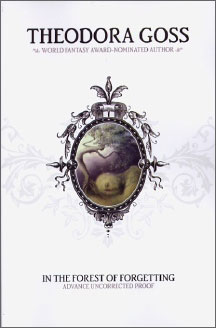 |
 Theodora Goss
Theodora Goss
In the Forest of Forgetting
Reviewed by: Terry Weyna © 2006
Prime Books
US Hardcover First Trade Edition
ISBN 0-8095-5691-X
Publication Date: April/May 2006
284 Pages; $24.95
Date Reviewed: May 7, 2006
Index:
Fantasy
Horror
Science Fiction
General Fiction
The frustrated scholar in me wants to pin down exactly what “The New Weird” is, and where it comes from. The happy reader in me, though, wants only to read ever more of it. I may not be able to define The New Weird yet, but I know it when I see it. ‘In the Forest of Forgetting’ illustrates it vividly, and this weird and wonderful collection will give those who enjoy their fantasy mixed with a soupcon of horror that particular joy that comes from reading something utterly new.
My favorite story is “Miss Emily Gray.” It has a familiar theme — be careful what you wish for — but it plays out so malignantly, and yet with such an odd innocence, that it sneaks under your skin and haunts you for days after you read it. It makes a later story, “Lessons With Miss Gray” seem more haunting for our understanding of who Miss Gray is, and the lesson comes home: “You gain and you lose, with every choice you make.” In retrospect, those choices that seemed so easy then now seem like they should have been hard, and made with a lot more thought; but we were young then. Is that Miss Gray that we see again in “Conrad,” now a nurse? This time, she is a cause of good; perhaps she always is? Mysteries abide within mysteries in this collection.
Or maybe my favorite story is “Professor Berkowitz Stands on the Threshold.” This story, another one in which choice is key, reads the way Salvador Dali’s “The Persistence of Memory” looks. Indeed, the vignette headings in this story sound like the titles of surrealist paintings: “The Sea Is as Deep as Death, and as Filled with Whispers,” and “My Mind Crawls, Like a Snail, Around One Thought.” Goss writes in such a way that the surrealist images of her story vividly form in the mind’s eye: feathers instead of flowers growing on the bushes, a woman wearing a flamingo on her head. Professor Berkowitz’s quest for tenure by writing a monograph about a poet who wrote her lines on driftwood and sent them into the wind, his “real life,” is as otherworldly as the situation — dream or otherwise? — in which he finds himself in this story.
A number of the stories have an Eastern European edge to them, with a seemingly deliberate stiltedness in the language (that is, as if they were translated, or at least drawn from the style of Kafka) and the names of people and places. “Letters from Budapest,” for instance, is an epistolary story of a young man who has gone away from home to art school. Once there, he quickly learns that his teachers want nothing from him but art that glorifies the communist state, and that any other art is considered decadent and forbidden. But he discovers Les Fantaisistes, a group of artists who paint surrealist fantasies on their canvases, and he is captured, insisting that he will paint in no other manner. He particularly becomes infatuated with the art of Tamora Von Graff, not aware that it is a dangerous thing to seek out this woman, to be a part of her art, to live the type of art she paints.
“The Wings of Meister Wilhelm” is another story that remains in the mind long after it is read. A lonely child is sent to a lonely and penurious man — a man momentarily mysterious to the community, but soon to assume the status of a pariah — to take violin lessons. She swiftly learns of his special project: to hear the bells of Orillion, and to fly to that island in the sky where everyone is an artist. In a sideways rewriting of the legend of Daedalus and Icarus, Goss tells again the sad story of unreasoning prejudice and the only means to escape it.
Goss also dabbles in post-modernism in such stories as “The Rose in Twelve Petals,” a retelling of Sleeping Beauty in a dozen vignettes, and “Sleeping With Bears,” a story that does The Three Bears one better. “The Rapid Advance of Sorrow” is full of images of cold and white and Siberia. “The Belt,” which starts with the line, “My story has the contours of a fairy tale,” becomes a political disquisition.
As with most collections that gather together nearly everything that a young writer has written, there are a few tales here that do not resonate. But even those tales bear a telltale mark of distinction, and have an oddness that is characteristic of Goss’s writing. The reader is never quite sure of her footing while reading Goss; the ground tilts, the sky turns green and the world seems simply — off. One feels the enjoyable dizziness of a sip too much of wine, of a vintage unique and bold. This delicious book makes one hope for more Goss; one anticipates her first novel, if such is to be, with an urgent joy.
|
 |
